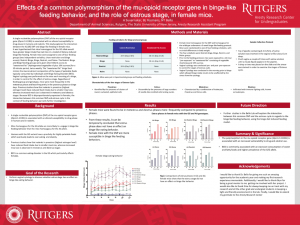Suvarnakar, Aashka: Inhibition of lateral hypothalamic orexin neurons on binge-like eating behavior in mice
Title: Inhibition of lateral hypothalamic orexin neurons on binge-like eating behavior in mice
Name: Aashka Suvarnakar
Major: Cell Biology and Neuroscience
School affiliation: School of Arts and Sciences
Programs: Aresty – Research or Conference Funding Recipient
Other contributors: Nicholas T. Bello, Lori Scarpa, Dr. Luis de Lecea, and Dr. Vanessa Routh
Abstract: According to previous research, the role of orexin is multifaceted. It is involved in regulating the sleep-wake cycle, food intake, the reward system, attention, amongst other functions. It is believed that increasing brain levels of orexin correlates with increased food motivation. The role of central orexin signaling in eating pathologies is not known. The goal of my project was to determine whether inhibition of orexin neurons can alter the development and expression of binge-like eating behavior in mice. Through stereotaxic methods, adeno-associated virus (AAV) was microinjected into the lateral hypothalamus of transgenic (orexin/hypocretin: CRE recombinase) mouse brain. This virus expresses the inhibitory G-protein coupled receptor (GPCR), hdm4i, which is a Designer Receptors Exclusively Activated by Designer Drugs (DREADDs). The designer drug is clozapine N-oxide (CNO) and causes the orexin neurons to be inhibited. I used a binge model for the mice to observe binge-eating behavior and compared it to their binge-eating behavior when the orexin neurons are inhibited. Based on the data I collected, statistical significance was only observed between the Restrict Binge mice that received CNO and the Restrict Binge mice that received Saline in the total amount of food (chow and sweetened fat) consumed and the total amount of sweetened fat consumed. No significant difference was seen overall between the mice that received CNO and the mice that received Saline when looking at all four groups. The ultimate goal of this research is to understand the role of orexin in binge-eating behavior which can potentially help in the development of therapeutic treatments for eating disorders.
